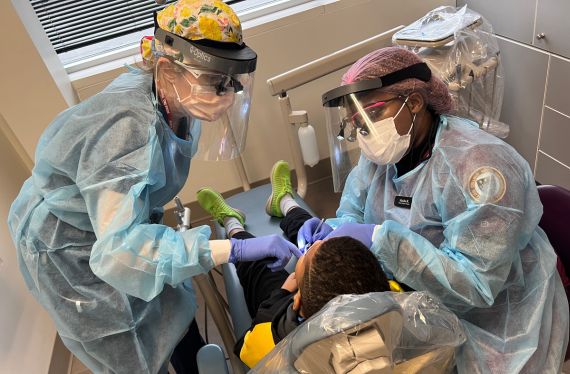The final Regis College President’s Lecture Series on Health of the academic year brought together a panel of experts to discuss the wide-ranging impact of society’s most pressing issue: the coronavirus pandemic.
More than 150 participants gathered via Zoom on April 7 for the lecture titled “COVID-19: Causes for Change and Optimism.” It was moderated by Penelope Glynn, PhD, RN, coordinator of the lecture series. The panel featured Erica Shenoy, MD, associate chief of the infection control unit at the Massachusetts General Hospital; Matthew Germak, MD, chief safety and quality officer for Beth Israel Lahey Primary Care; Natalia Linou, ScD, executive director of the François-Xavier Bagnoud Center for Health and Human Rights at Harvard; and Andrew Garland, PhD, a fellow at the Johns Hopkins Berman Institute of Bioethics.
The panelists explored the myriad of challenges the pandemic has presented across medicine, socioeconomics, and ethics, while also examining how changes for the better can come about in the future. Shenoy, who has helped lead MGH’s COVID-19 response, gave an extensive overview of the coronavirus and what has been learned over the past year from transmission to remediation to vaccines.
“We are not out of this yet but there is a lot of reason for optimism,” Shenoy said.
Germak presented on his institution’s response to the pandemic as it relates to patient care, including its rapid overnight shift to telemedicine. By March of 2020, Beth Israel Lahey Primary Care had shuttered many of its 85 practices, and opened 14 regional cohorts to in-person care, with telemedicine visits, accounting for almost all of the 57,000 visits in April 2020.
“A massive and rapid care delivery shift had to take place out of necessity,” Germak said.
With the move to more telemedicine visits, Germak applauded the work of primary care nurses who were critical in triaging patients and determining risks levels for those who may still needed to be seen in-person. He also spoke of the associated silent pandemic of behavioral health issues, for which telemedicine could remain a valuable resource.
Hand-in-hand with the devastating health impact, the pandemic has underscored ongoing socio-economic disparities in jobs, education, housing, and health access. Among the stats Linou presented, a study published one month ago by the Center on Budget and Policy Priorities found one in five Black and Latinx adults still had trouble putting food on the table.
“Having true food and housing insecurities in one of the world’s wealthiest countries should concern us all,” said Linou. “We can build back in a sustainable way if we don’t look at this as a one-time emergency. We are in a unique time, but it isn’t unique in that it could happen again.”
The lecture closed with a presentation by Garland who began his remarks by posing to the participants a scenario about administering the vaccine to an individual who was not eligible, but who would greatly benefit from receiving it now. He said that when considering policies and enforcement, we must consider genuine reason versus inconvenience.
“Making good policy is hard,” he noted. “There are always going to be tradeoffs and it is almost impossible to craft a policy that doesn’t require exceptions.”
Since 2007, the Regis President’s Lecture Series on Health has featured insight from industry experts that inform health care professionals and the public about contemporary health and wellness issues. The goal is for audiences to gain the knowledge needed to affect positive change.
This lecture series has been approved to award contacts hours for nurses by the American Nurses Association Massachusetts. The American Nurses Association Massachusetts is accredited as an approver of continuing education by the American Nurses Credentialing Center’s COA.



